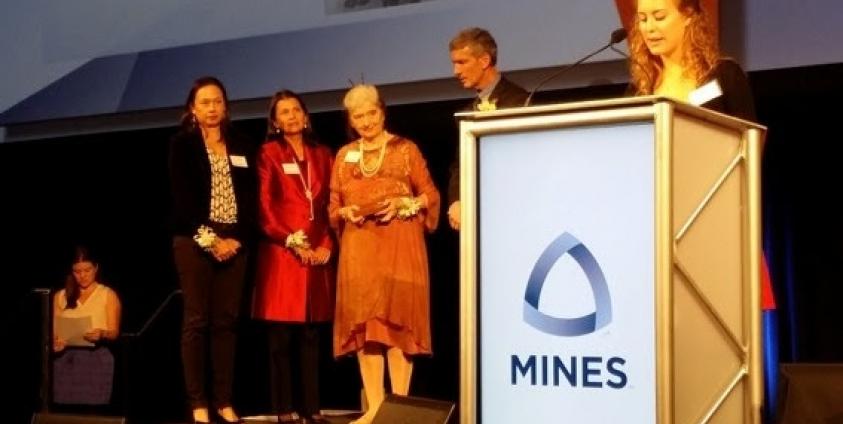Last Thursday the Colorado School of Mines posthumously conferred on Sao Kya Seng, the last Saophalong (ruling prince) of the Shan State of Hsipaw, the Distinguished Achievement Medal in recognition of his outstanding professional achievements as an alumnus of the institution.
The President of the university, Dr. Paul Johnson, presented the award to Inge Sargent, Sao Kya Seng’s widow and the former Mahadevi (Celestial Princess) of Hsipaw, accompanied by their two daughters, Sao Mayari and Sao Kennari. The ceremony was held in Golden, Colorado and attended by over 300 guests.
Sao Kya Seng attended the university from 1949-1953, graduating with a degree in mining engineering. It was while studying there that the prince met and fell in love with a fellow international student, Inge Eberhard, from Austria, who had won a Fulbright Scholarship to study in Colorado in 1951. The couple married in 1953 and soon thereafter, moved back to Burma. She became Sao Thusandi, the Mahadevi of Hsipaw, and quickly learned the Shan language and customs, earning the title Sao Mae or royal mother, from her adopted family.
Among the most progressive of the Shan royalty, the young couple put their American-acquired education to work. While Sao Mae primarily focused on developing programs to improve health and education, Sao Kya Seng founded the Tai Mining Company soon after his return. He had planned to develop lead and silver deposits in the Kalagwe area of the state, as well as other natural resources—including salt, antimony, zinc, and gold deposits—to help improve the economy and livelihoods of the people of his primarily agrarian state.

Engraved silver copy of Sao Kya Seng’s diploma, which was presented to Sao Mae at
the event (Photo courtesy of Sai Awn Murng)
“The two of us were like a Little Peace Corps,” recalled Sao Mae, whose story is immortalized in her book Twilight Over Burma: My Life as a Shan Princess, published in 1994. The book has also been adapted into a film, which will premiere in German on October 26, 2015.
“[Sao Kya Seng] had planned to develop [Hsipaw’s mineral wealth] in a responsible and safe way so that the Shan people could reap the benefits of development,” she said in her award acceptance speech.
However, what should have been a fairy tale came to an abrupt halt with Ne Win’s coup in 1962, a political shift that would usher in almost five decades of brutal military rule.
“Unfortunately, the military coup occurred as some of the equipment arrived from overseas,” Sao Mae explained. “All Shan people who believe in education will be proud of what the last Saopha of Hsipaw, Sao Kya Seng, was able to achieve in spite of the Burmese military and those Shans who conspired with them. He not only tried to reform the political system but worked for the economic improvement of all people living in the Shan States.”
Most of the Shan princes were arrested and imprisoned. The ruling prince of the Shan State of Yawnghwe, Sao Shwe Thaike, who was also the first President of Burma, died in prison under suspicious circumstances.
“We were all staying at the house [Sao Kya Zone’s residence in Taunggyi] and that morning [of the coup], army officers showed up and called my father away for a ‘meeting’ with the local military commander,” recalled Hkun Htun Oo, the leader of the Shan Nationalities League for Democracy (SNLD) and himself also a former political prisoner. His adoptive father was Sao Kya Zone, Sao Kya Seng’s older brother.
“They did not explain any further but told him to bring his toothbrush, any regular medicines, and warm clothing, so it was clear that he was going to be detained,” he said.
“That ‘meeting’ lasted five years in Insein [Prison]. I was about to leave for school and warned my uncle [Sao Kya Seng] to be careful, I suspected a coup. After the car dropped me off at school, he took the same car to Heho. Along the way, he was detained and taken away to the Eastern Command.”

Sao Kya Seng and Sao Thusandi, as Saophalong and
Mahadevi of Hsipaw
Sao Kya Seng was last seen at the army checkpoint near Taunggyi. He was never heard from again. Sao Mae was initially placed under house arrest before fleeing to Austria in 1964 with their two daughters. She would return to Colorado, remarry, and work as a high school teacher until her retirement, when she and her husband, Howard Sargent, established the Burma Lifeline charity to provide aid to the peoples of Burma, particularly ethnic populations living along the country’s border areas.
Although over five decades have passed since Ne Win’s military coup and Sao Kya Seng’s arrest, the former Mahadevi of Hsipaw and her two daughters continue to write letters every year to the Burmese government, including the current quasi-civilian Thein Sein administration, asking about the fate of Sao Kya Seng. Their inquiries continue to be met with silence.
By SAI AWN MURNG / Special Contributor to Shan Herald Agency for News (S.H.A.N.)







